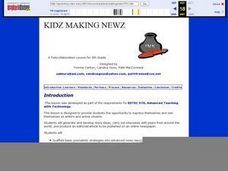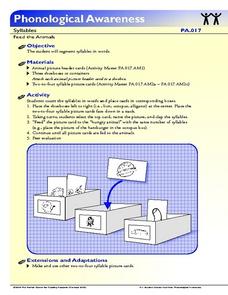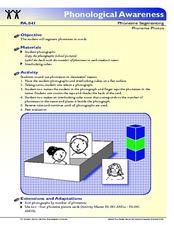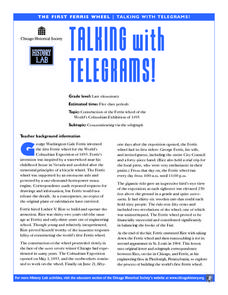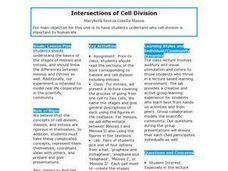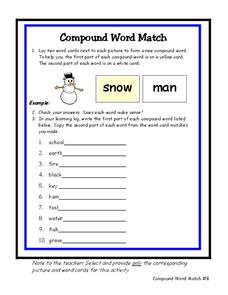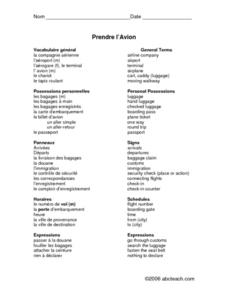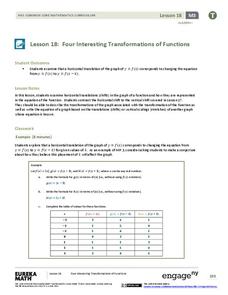Curated OER
Letters from Emily Dickinson: Letters and Poems
Students analyze how Emily Dickinson perceived herself as a poet. Students read correspondence between Dickinson and her preceptor, Mr. Higginson to determine the depths of their relationship. Students interpret several of her poems.
Curated OER
Y-Intercept and Slope Intercept Form
Alegebra amateurs identify the slope and the y-intercept given a linear equation in slope-intercept form by correctly completing some in class problems. They write the linear equation in slope-intercept form that corresponds to the given...
National Endowment for the Humanities
Emulating Emily Dickinson: Poetry Writing
High schoolers analyze mood and voice in Emily Dickinson's poem, "There's a Certain Slant of Light." After the analysis, students write a poem of their own emulating the Dickinson poem, and then write a one-page essay describing what...
Curated OER
Kids Making News
Fifth graders correspond with one another regarding interesting global topics. They swap interview questions and collaborate in the publishing of an online newspaper. This should be a highly motivating lesson plan which get kids writing!
Florida Center for Reading Research
Fluency: Words, I Read, You Point
Learners read as many high-frequency words as possible in a given amount of time. Peer one reads a word from a list, and peer two points to the corresponding word as they are seen on the table. This activity is timed and peer evaluated.
EngageNY
Four Interesting Transformations of Functions (Part 3)
Continue the study of transformations with an examination of horizontal stretches, shrinks, and reflections. Individuals use the same process used in parts one and two of this series to examine horizontal changes. The resource also...
Florida Center for Reading Research
Phonics: Letter Recognition, Venn Diagram Letter Name Sort
What’s in a name? Letters, of course! Partners place the letters of their names on a Venn diagram. Letters they have in common are named and placed in the overlapping area of the circles, while letters unique to just one of the names are...
Florida Center for Reading Research
Phonological Awareness: Syllables, Feed the Animals
An activity challenges scholars to sort picture cards based on the number of syllables they count as they say the item's name on each card. Depending on how many syllables they count, they place the card in the corresponding box...
Florida Center for Reading Research
Phonological Awareness: Phoneme Segmenting, Phoneme Photos
This great activity incorporates counting, phoneme segmenting, and class photos. In pairs, learners take turns saying, counting, and checking the number of phoneme segments found in their classmates' names. They count the phonemes and...
Illustrative Mathematics
Comparing Numbers
Young mathematicians spin their way to a deeper number sense with this fun, collaborative activity. Using two spinners, one with the numbers 0-9 and the other with the decades 00-90, pairs of students take turns building and comparing...
Curated OER
Telegrams!
Students read and analyze original telegrams to learn about people involved in and process of building the world's first Ferris wheel, examine correspondence between inventor and engineer to understand planning necessary to build Ferris...
Curated OER
Intersections of Cell Division
Learners listen to a lecture covering the process of going from one cell to two cells. Using the textbook, students differentiate between meiosis I and Meiosis II. Learners work in pairs to create one stage using pipe cleaners, sequins,...
Curated OER
Treasure Tales
Create an artifact kit to engage your young learners. Then, assign small groups a section of chapter three. They will identify the main idea and three supporting details for their section. Then, they select one artifact from the kit that...
Curated OER
Fourth of July Addition and Subtraction
What is Thomas Jefferson signing? Focus on American history with this cross-curricular math puzzle. Learners utilize addition and subtraction skills to solve the mystery of the Fourth of July. All numbers are 3-digit, and there are no...
Florida Center for Reading Research
Phonological Awareness: Syllables, Clapping Names
Scholars practice identifying and counting syllables. Images of classmates are cut out and placed on a chart. Learners clap and count the syllables in each child's name. They finish by writing the number of syllables under the...
Florida Center for Reading Research
Phonological Awareness: Phoneme Blending, What's My Word?
At a listening station, learners listen to a pre-recorded script; they follow the directions and number each picture on their picture chart corresponding to the segmented phonemes they hear.
Curated OER
Triangle Series
Your algebra learners emphasize the"geometric" in geometric series as they use a common ratio between algebraic terms and find that it corresponds to a repeated similarity transformation.
California Education Partners
Least and Greatest
Squares can be magic. Pupils use their knowledge of addition of positive and negative rational numbers to create a 3 X 3 magic square where the sums are 1. Scholars create addition and multiplication expressions with a set of rational...
Generation Rx
Medication Safety Patrol: Trivia Game
It trivia time! Small groups work collaboratively to answer questions all about medication safety. Groups earn points with each correct response, and as the ultimate game changer, they wager all or a portion of their points on one final...
Carl's Corner
Compound Word Match
Compound words are the focus objective of the worksheet. Learners match the first and second part of each word that is written on index cards, along with the corresponding picture. Children develop 10 compound words that are listed on...
Curated OER
Prendre l'Avion
Do you want to travel to a French-speaking country? Then you need to know these vocabulary terms! The first page is the reference page, and it contains about 30 vocabulary terms and their definitions. After reviewing the terms, give each...
Wilson Language Training Corporation
Handwriting Worksheets
Support your pupils as they learn how to write the alphabet, words, and even sentences. The handwriting pages all use the Wilson Writing Grid, in which each line corresponds with a particular letter height and an image (for example, the...
Novelinks
The Adventures of Tom Sawyer: Cubing Strategy
The toss of a die determines what questions your pupils will answer in this instructional activity. Learners respond to questions based on Bloom's taxonomy, discussing The Adventures of Tom Sawyer with classmates along the way. They...
EngageNY
Four Interesting Transformations of Functions (Part 2)
What happens to a function whose graph is translated horizontally? Groups find out as they investigate the effects of addition and subtraction within a function. This nineteenth lesson in a 26-part series focuses on horizontal...
Other popular searches
- One to One Correspondence
- One on One Correspondence
- One to One Correspondence Math
- 1 1 Correspondence Math
- One to One Correspondences





